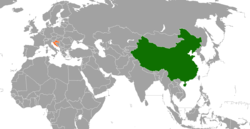Culture and education
Educational and cultural cooperation between the two countries is being maintained under the Agreement on cultural cooperation that was concluded in March 1993.
University of Zagreb offers major in Sinology since October 2004, while Beijing Foreign Studies University offers a major in Croatian. [5]
The Confucius Institute in Zagreb was opened in May 2012.
In May 2013, China and Croatia signed "Plan for Cooperation in Education for the Period of 2013-2016", providing yearly scholarships to Chinese and Croatian students.
This page is based on this
Wikipedia article Text is available under the
CC BY-SA 4.0 license; additional terms may apply.
Images, videos and audio are available under their respective licenses.

